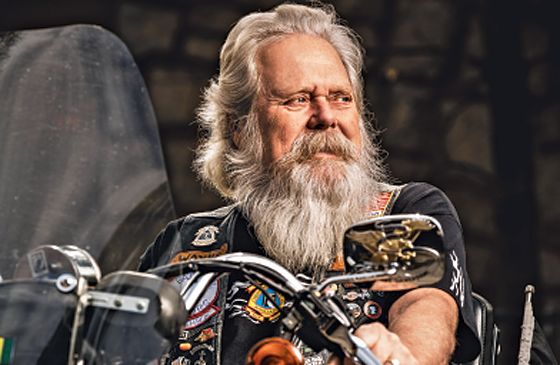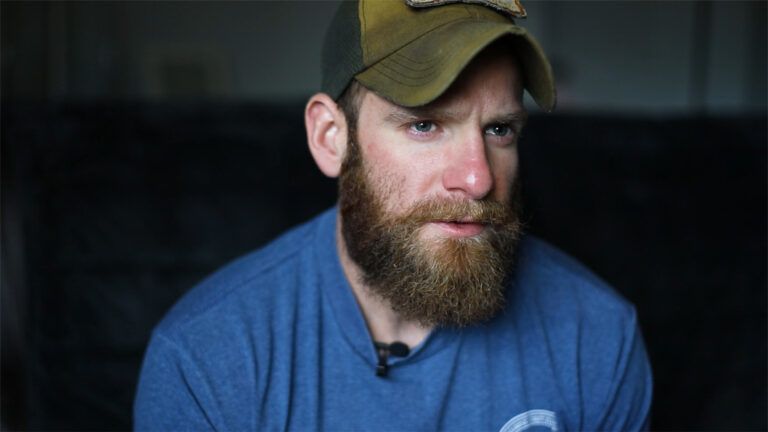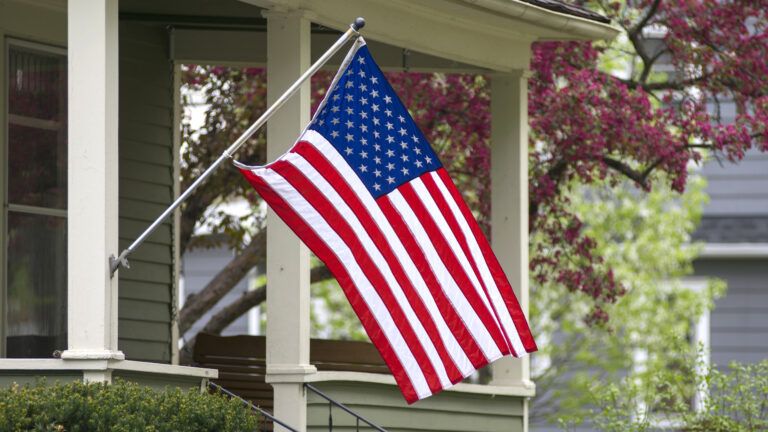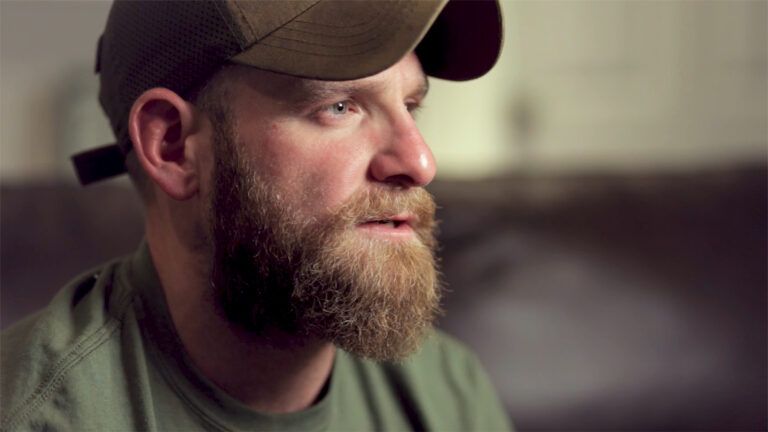The motorcycles lined up two by two in the hotel parking lot. A gleaming row of rumbling chrome and leather. Guys in chaps and jackets covered with patches. It was a bright blue May morning in the Sierra Nevada foothills. A perfect day for the start of a long ride.
The 40 of us gathered there were experienced bikers. Veterans, in more ways than one. But everyone looked a little on edge. This was no ordinary ride. These were no ordinary men.
I know I was nervous. The ride leader, Steve Mulcahy, had just asked me for a favor. “Wayne,” he said, “our chaplain just called. His bike broke down. Can you take over?”
Bring faith and inspiration to our troops! To donate a Guideposts subscription now, click here.
Me? Chaplain? For a bunch of bikers? The guys in this parking lot all had one thing in common. We’d served in the military. And now we were about to embark on a 10-day cross-country trip to Washington, D.C., for a motorcycle rally on the National Mall called Rolling Thunder.
For two decades, motorcycle-riding vets have descended on D.C. on Memorial Day weekend to honor soldiers and bring attention to prisoners of war and those missing in action.
For years I’d wanted to do this ride, organized by the National Veterans Awareness Organization. At last I had the time and the money. But ride as chaplain?
Sure, I was a founding member of my local Christian Motorcyclists Association chapter. But I was still coming to terms with what this ride meant for me. I still struggled with memories I’d spent the better part of my life trying to forget. How could I be a spiritual guide to these guys when I felt so shaky inside?
“Sure,” I told Steve. What else could I say? How could I explain to him things I could hardly explain to myself?
“Mount up!” Steve called.
We pulled out of the parking lot and roared onto the highway. The missing man formation went in front: five guys in rows of two, with one space left empty to honor the unknown soldier. Everyone else was staggered in a line behind.
Road guards pulled ahead at intersections to clear the way so we could keep rolling. It truly was a gorgeous day, the air scented with pine. But it didn’t take long for my mind to drift into memories. I knew this would happen. I knew it had to happen. I’d tried to prepare myself. But really, you can’t.
My ’Nam memories were different from other vets’. And that was part of the problem. I’d done everything I could to avoid the draft. I even asked my doctor to X-ray me in case some hidden medical problem might keep me out.
Nope. I was inducted in September 1971 and shipped out the following May for a 10-month tour. I was assigned to a Criminal Investigation Division unit as a case processor on a big base near Saigon.
In those days of the war, morale was rock bottom and soldiers were heavy into drugs, fragging officers, shooting each other over girls. No one was more hated than guys in the rear, especially criminal investigators.
Sometimes I felt like I was the enemy, not the Viet Cong. I never got shot at but I saw plenty of ugliness, plenty of things I wish I hadn’t.
It wasn’t just the crime-scene memories I wanted to forget when I got home. I hadn’t been out in the jungle. I felt like I hadn’t been a real soldier. Besides, everyone Stateside hated the war by that point. “Don’t want to talk about it,” I’d mumble when people asked what it was like.
I didn’t struggle with alcohol and drugs like some vets did. I found work as a carpenter and stuck with it. Now I owned my own contracting business. I came to the Lord about 10 years after ’Nam and never looked back.
Still, I had three failed marriages. I guess you could say I had trouble with relationships. No matter how hard I tried I couldn’t fill that hole where I’d tried to bury my war memories, bury them alive.
Rumbling down the highway on my Harley, I told myself to snap out of it. At the end of each day’s ride it was my job to say a blessing over dinner. That’s what the chaplain did. Prayed before meals and was available to guys in need. It was the second part that worried me.
By day three we were in the Rockies. The scenery was jaw-dropping. But I hadn’t counted on the freezing temperatures in the mountains. I had on tons of layers–leather coat, vest, do-rag, gloves and liners. And still I was numb with cold.
I was in the missing man formation that morning. It started to snow. Flakes collected on my windshield till all I could see were the lights on the bike ahead of me. It was like snow falling on my memories too, making everything that much colder.
What are you doing here, Wayne? I asked myself. I was almost 61 years old. This crazy ride wasn’t going to change anything, especially not the past. I’d gone to war, done my duty and come home. I’d moved on. But had I?
Suddenly I heard a voice. Five simple words: Who are you riding for? My eyes fell on the space left in our formation for the missing soldier. A strange warmth came over me. I gripped my handlebars harder, squeezing back tears, and followed the road as it wound up toward the peaks.
A couple of days later, we were on the Great Plains. We fought to keep our bikes upright in gusty wind. Then it got muggy and we slogged through thunderstorms. All the time I kept my eyes on that missing man.
One morning, in Nebraska, I worked up my courage to say a little more than a prayer at breakfast. I talked about how I’d made my first-ever trip to see the Vietnam Veterans Memorial back in 2003.
“Because of where I served, I didn’t know anyone who died,” I said, glancing around the room to see what everyone thought about that. No one seemed to mind. “So what I’m going to do when we get to the memorial,” I continued, “is pick a name at random from the year I was in ’Nam and dedicate this ride to him.”
The room fell silent. I could see men choking back tears. I bowed my head and said a blessing. The minute I sat down, guys were coming up to me.
“Thank you,” they kept saying.
And from that moment, the stories poured out. I heard about it all. Buddies killed. Horrific sights. Lives wrecked back home. Booze, drugs, homelessness, prison.
“No one understood then and they still don’t,” one guy said. “It’s like the whole country just shoved it down in a hole. Like if they ignored it, it would go away.” Just like I had.
We rode on. As we got closer to D.C. we started seeing banners draped from overpasses. Thank you for your service. Welcome home, soldier. I’d waited 40 years to see something like that.
At last we arrived. The entire city seemed to shake and rumble with the sound of motorcycles. The Mall was packed. Every war memorial–World War II, Korea, Vietnam–was obscured by crowds of guys in biker gear.
We made our way toward the Vietnam Veterans Memorial. It’s a wall of black rock sunk into the ground of the Mall, inscribed with the names of more than 58,000 men and women killed or missing in action. The memorial is always crowded. That day, we could hardly get to it at first.
Then, suddenly there we were, face-to-face with the reflective black stone. Some of the bikers had never seen the wall before. They approached hesitantly, eyes scanning the etched names for ones they recognized. I ran my finger across the rows until I reached my year in ’Nam.
I stopped at a name. Billy Wyatt. I stood there a minute totally still. I wondered what Billy looked like, how he died. Slowly I made a tracing of his name and closed my eyes to pray.Billy, I dedicate this ride to you. God rest your soul.
I heard a cry. I turned and saw one of the men from our group fall to the ground. He sat crumpled, head in hands, weeping. He’d found his best buddy’s name.
I rushed over and knelt down to put an arm around him. Another guy joined us. For a moment we all just held each other. I tried to pray.
I don’t remember exactly what I said. But the words didn’t matter. What mattered at that moment was that whatever I’d feared at the start of our ride was gone. That hole inside me…. The guys I’d ridden with, my brothers-in-arms, they helped to fill the emptiness. And there was Someone else with us too.
Who are you riding for? Maybe the better question was: Who rode for us? We’d fought and suffered. Few people celebrated our return home. But God was alongside us the whole time.
He climbed down into that hole with us. He rode over the mountains and through the snow and rain. And now he was here, sharing our pain and lifting us up.
Holding my fellow veterans there by the wall, praying for them, it was like I heard that voice from the mountains all over again. And this time he said, Welcome home, soldier.
Click here to learn more about Veterans Awareness Month and what you can do to help.







